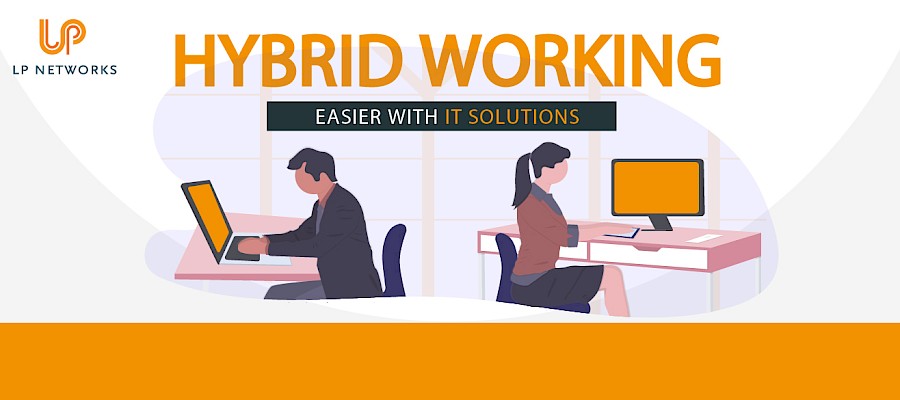- Solutions For
Specialist IT Support Services for:
- Popular Services
- Security
Security
- Our Expertise
Our Full Range of IT Services
- Learn
- About Us
- Contact
Posted 17th February 2022

One of the more interesting results of the Covid-19 pandemic is the growth in acceptance of hybrid working. In fact, working from home and a reduced commute has become a key factor for 18–34-year-olds when choosing a job. On the other hand, many considered a lack of flexibility in work locations a turn off. This data goes hand in hand with news that during 2020, 227,000 UK workers applied to become freelancers, with 90% stating that they planned to continue freelancing beyond the pandemic.
So, what can employers do?
The Institute of Work and Facilities Management (IWFM) has released interesting findings that may encourage employers to consider embracing a hybrid or flexible working model.
The data from the IWFM’s survey is fascinating; 63% of employees now believe that the office is unnecessary, and a significant majority expect opportunities for hybrid working as furlough and social distancing end. Another notable statistic is that 79% of 18-24-year-olds stated that they believe they are equally (if not more) productive when they work from home.
While it’s undeniable that many businesses need office space and staff gain significant benefits from working face to face in teams, the last two years have also proved that home working is a feasible and attractive option for many, which is where hybrid working comes into play.
Hybrid working gives team members the best of both worlds; the opportunity to split their time between home and the office. Many businesses have already been forced to embrace home working because of the pandemic. For many, it’s worked, so introducing a system that embraces the positives of office and remote working. To ensure that a move to hybrid working occurs smoothly, businesses should consider how technology can have an impact.
Microsoft Office 365 works by safely storing all your files and documents on the Cloud. This means that your team can access them anywhere from any device so long as they have internet access. Alongside this, the system also provides opportunities for collaboration on projects, for multiple users to work on documents in real-time, and video conferencing and communication through Teams.
Using Microsoft Office allows staff members to access files, chat with colleagues, and collaborate on editing documents from any location. And utilising the Cloud means that team members can seamlessly switch between office and home locations.
As a Microsoft Silver Partner, LP Networks can offer tailored Office 365 bundles on monthly subscriptions, enabling businesses to only pay for what they use. Buying the software this way also provides the flexibility to increase or decrease your licences as your company evolves and as staff working patterns change.
Embracing Cloud Solutions is a fantastic way of futureproofing your business. Aside from improving security, it also makes hybrid and remote working a realistic option.
The Cloud is more than just a place to upload documents; it’s also a cost-effective and resilient way of enabling your team to access information wherever and whenever they need it. From utilising Cloud-based software such as Microsoft365 to running hosted desktops, there are multiple solutions available depending on the size and needs of your business.
Improved access via the Cloud can provide the opportunity for your team to use their own devices for work. However, while this can be a cost-effective solution for hybrid and remote working, you must consider the security implications of a potential GDPR breach. Less rigorous security compliance and the chance of a device falling into the wrong hands means that businesses need to take measures to keep their corporate data safe.
Staff training can help them spot potential dangers from phishing attacks, and improved endpoint security adds an extra secure layer to your network. In relation to smartphones and tablets, one option is to use Mobile Device Management which provides the facility to remotely wipe data and block apps from interacting with company information and files.
VoIP phone systems work by routing phone calls through the internet to any handset. So, a team member could be working from home but still be able to answer business calls through their mobile phone via a handy app.
VoIP is cheaper than a standard landline, and international calls are significantly more cost-effective. Microsoft Teams can be extended to include phone system functionality.
If you do decide to embrace flexible working and encourage your team to work from home for part of the week, you must ensure that they have access to a remote IT Support Desk. With an increased reliance on the Internet and IT, any failures or glitches in the system could immediately impact on staff productivity.
LP Networks offers a remote IT service desk, manned by experts and available during office hours, meaning your remote workers can get back up and running in no time.

